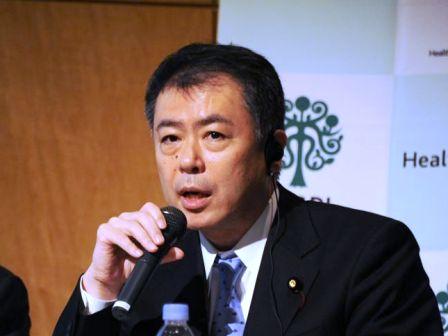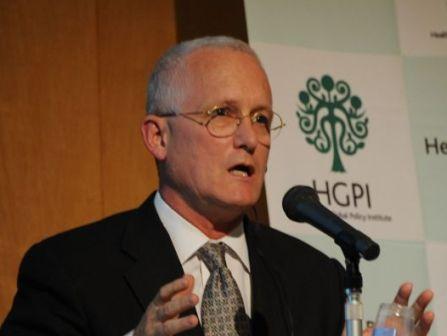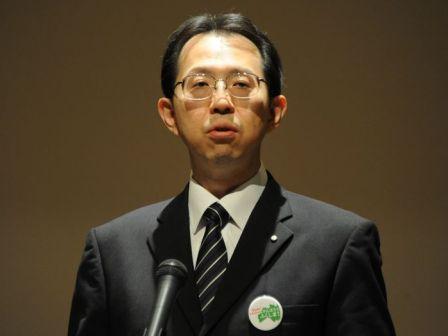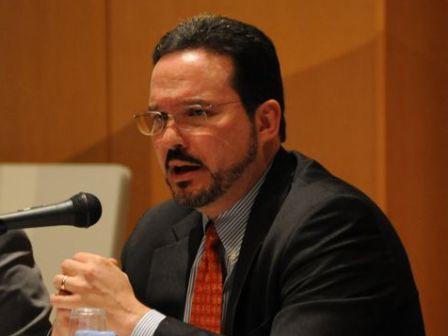Reconstruction in Tohoku: An Open Dialogue on Strategies and Partnerships
date : 11/11/2011
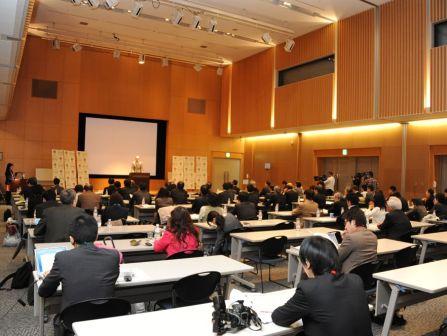
>>★Video on the day (YouTube)
★You can download the report on this forum from the right.
On November 11, 2011, an urgent forum on the theme “Reconstruction in Tohoku: An Open Dialogue on Strategies and Partnerships” was jointly convened by Health and Global Policy Institute and The Center for Strategic and International Studies (CSIS) at CORASSE Fukushima. To mark the early November publication of the recommendations of the CSIS-Keidanren (Japan Business Federation) collaboration, “Partnership for Recovery and a Stronger Future: Task Force on U.S.-Japan Cooperation after 3/11”, around 70 people from Japan and overseas, including government officials, healthcare providers, executives of healthcare-related enterprises, leading media journalists, and members of the public, gathered in Fukushima to focus on establishing an open platform to facilitate long-term international cooperation in health and healthcare in the stricken Tohoku area.
After welcoming participants to the event, HGPI Chairman, Dr. Kiyoshi Kurokawa, together with Vice-Governor of Fukushima, Mr. Masao Uchibori, and Minister-Counselor for Economic and Science Affairs at the U.S. Embassy, Mr. Marc M. Wall, outlined both current and future endeavors to support the region’s recovery, and also emphasized the significance and implications of the forum.
In the first of the forum’s panel discussions, “Reconstruction & Challenges: Strategies for the Japan-U.S. Partnership”, CSIS Senior Advisor and Japan Chair, Dr. Michael Green, explained the recommendations for Japan’s reconstruction put forward by the CSIS Recovery Task Force, and then, emphasizing the urgency of Japan’s recovery from the standpoint of global stability, discussed the need to strengthen cooperation so that the knowledge and experience of the United States can be harnessed to contribute to reconstruction efforts in Japan. Next, from his own struggles to operate a bus company in the 3 devastated prefectures, Mr. Kazuhiko Toyama, CEO of Industrial Growth Platform, Inc., spoke of Japan’s strengths and weaknesses as they emerged in response to the disaster, and of the challenges that lie ahead and the world’s expectations for a reconstructed Japan.
In the second panel discussion, “A New Health & Healthcare Model for Tohoku ~ An Open Collaborative System”, based on on-site experience and healthcare expertise, 4 speakers – CSIS Vice President, Dr. J. Stephen Morrison, the Hon. Mr. Mitsuru Sakurai, Acting Chairman of the Democratic Party of Japan’s Policy Research Council, Mr. Yoshifumi Baba of Fukushima Prefecture’s Health and Welfare Division, and Professor Ichiro Tsuji of the Tohoku University Graduate School of Medicine – discussed the importance of a platform for domestic and international cross-functional cooperation, including both short- and long-term measures for dealing with radiation and securing sufficient numbers of healthcare personnel. With the health and healthcare-related recommendations of the CSIS Recovery Task Force centering on the 3 areas of radiation, reconstructing healthcare services, and psychological care, the panel’s 3 commentators, including Dr. Seigo Izumo of the Boston-Japan Medical Relief Initiative, then exchanged various opinions on the kinds of practical measures that are actually possible.
Finally, opinions were voiced from the audience regarding the need to strengthen cooperative efforts towards recovery among the various stakeholders, before Dr. Kurokawa closed the forum by emphasizing the importance of global multi-stakeholders constructing an open platform.
★You can download the report on this forum from the right.
On November 11, 2011, an urgent forum on the theme “Reconstruction in Tohoku: An Open Dialogue on Strategies and Partnerships” was jointly convened by Health and Global Policy Institute and The Center for Strategic and International Studies (CSIS) at CORASSE Fukushima. To mark the early November publication of the recommendations of the CSIS-Keidanren (Japan Business Federation) collaboration, “Partnership for Recovery and a Stronger Future: Task Force on U.S.-Japan Cooperation after 3/11”, around 70 people from Japan and overseas, including government officials, healthcare providers, executives of healthcare-related enterprises, leading media journalists, and members of the public, gathered in Fukushima to focus on establishing an open platform to facilitate long-term international cooperation in health and healthcare in the stricken Tohoku area.
After welcoming participants to the event, HGPI Chairman, Dr. Kiyoshi Kurokawa, together with Vice-Governor of Fukushima, Mr. Masao Uchibori, and Minister-Counselor for Economic and Science Affairs at the U.S. Embassy, Mr. Marc M. Wall, outlined both current and future endeavors to support the region’s recovery, and also emphasized the significance and implications of the forum.
In the first of the forum’s panel discussions, “Reconstruction & Challenges: Strategies for the Japan-U.S. Partnership”, CSIS Senior Advisor and Japan Chair, Dr. Michael Green, explained the recommendations for Japan’s reconstruction put forward by the CSIS Recovery Task Force, and then, emphasizing the urgency of Japan’s recovery from the standpoint of global stability, discussed the need to strengthen cooperation so that the knowledge and experience of the United States can be harnessed to contribute to reconstruction efforts in Japan. Next, from his own struggles to operate a bus company in the 3 devastated prefectures, Mr. Kazuhiko Toyama, CEO of Industrial Growth Platform, Inc., spoke of Japan’s strengths and weaknesses as they emerged in response to the disaster, and of the challenges that lie ahead and the world’s expectations for a reconstructed Japan.
In the second panel discussion, “A New Health & Healthcare Model for Tohoku ~ An Open Collaborative System”, based on on-site experience and healthcare expertise, 4 speakers – CSIS Vice President, Dr. J. Stephen Morrison, the Hon. Mr. Mitsuru Sakurai, Acting Chairman of the Democratic Party of Japan’s Policy Research Council, Mr. Yoshifumi Baba of Fukushima Prefecture’s Health and Welfare Division, and Professor Ichiro Tsuji of the Tohoku University Graduate School of Medicine – discussed the importance of a platform for domestic and international cross-functional cooperation, including both short- and long-term measures for dealing with radiation and securing sufficient numbers of healthcare personnel. With the health and healthcare-related recommendations of the CSIS Recovery Task Force centering on the 3 areas of radiation, reconstructing healthcare services, and psychological care, the panel’s 3 commentators, including Dr. Seigo Izumo of the Boston-Japan Medical Relief Initiative, then exchanged various opinions on the kinds of practical measures that are actually possible.
Finally, opinions were voiced from the audience regarding the need to strengthen cooperative efforts towards recovery among the various stakeholders, before Dr. Kurokawa closed the forum by emphasizing the importance of global multi-stakeholders constructing an open platform.
Exhibition date:2011-11-11
Top Research & Recommendations Posts
- [Policy Recommendations] The Path to a Sustainable Healthcare System: Three Key Objectives for Public Deliberation (January 22, 2026)
- [Research Report] Perceptions, Knowledge, Actions and Perspectives of Healthcare Organizations in Japan in Relation to Climate Change and Health: A Cross-Sectional Study (November 13, 2025)
- [Research Report] The 2025 Public Opinion Survey on Healthcare in Japan (March 17, 2025)
- [Policy Recommendations] Reshaping Japan’s Immunization Policy for Life Course Coverage and Vaccine Equity: Challenges and Prospects for an Era of Prevention and Health Promotion (April 25, 2025)
- [Research Report] The 2023 Public Opinion Survey on Satisfaction in Healthcare in Japan and Healthcare Applications of Generative AI (January 11, 2024)
- [Research Report] AMR Policy Update #4: Cancer Care and AMR (Part 1)
- [Public Comment Submission] “Assessment Report on Climate Change Impacts in Japan (Draft Overview)” (December 24, 2025)
- [Policy Recommendations] Developing a National Health and Climate Strategy for Japan (June 26, 2024)
- [Research Report] The 2026 Public Opinion Survey on Healthcare in Japan (February 13, 2026)
- [Research Report] The Public Opinion Survey on Child-Rearing in Modern Japan (Final Report) (March 4, 2022)
Featured Posts
-
2026-01-09
[Registration Open] (Hybrid Format) Dementia Project FY2025 Initiative Concluding Symposium “The Future of Dementia Policy Surrounding Families and Others Who Care for People with Dementia” (March 9, 2026)
![[Registration Open] (Hybrid Format) Dementia Project FY2025 Initiative Concluding Symposium “The Future of Dementia Policy Surrounding Families and Others Who Care for People with Dementia” (March 9, 2026)](https://hgpi.org/en/wp-content/uploads/sites/2/dementia-20260309-top.png)
-
2026-02-05
[Registration Open] (Webinar) The 141st HGPI Seminar “Current Status and Future Prospects of Korea’s Obesity Policy: Voices of People with Lived Experience in Policy Promotion” (March 3, 2026)
![[Registration Open] (Webinar) The 141st HGPI Seminar “Current Status and Future Prospects of Korea’s Obesity Policy: Voices of People with Lived Experience in Policy Promotion” (March 3, 2026)](https://hgpi.org/en/wp-content/uploads/sites/2/hs141-top-1.png)




